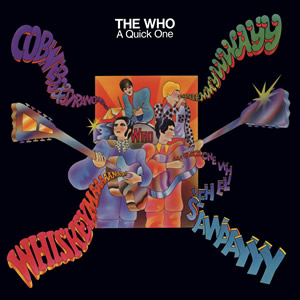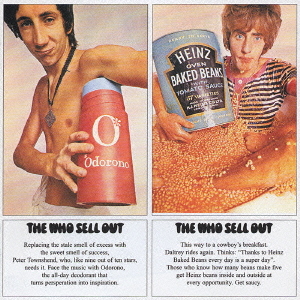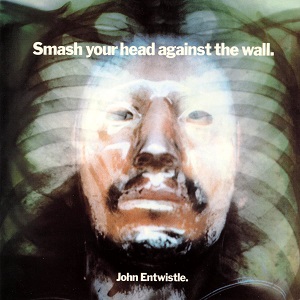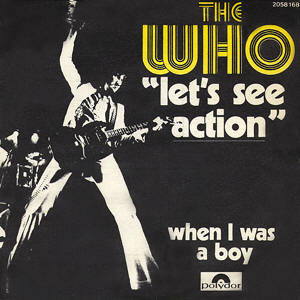Related Research Articles

The Who are an English rock band formed in London in 1964. Its core lineup consisted of lead vocalist Roger Daltrey, guitarist Pete Townshend, bassist John Entwistle and drummer Keith Moon. They are considered one of the most influential rock bands of the 20th century, and have sold over 100 million records worldwide. Their contributions to rock music include the development of the Marshall Stack, large public address systems, the use of synthesisers, Entwistle's and Moon's influential playing styles, Townshend's feedback and power chord guitar technique, and the development of the rock opera. They are cited as an influence by many hard rock, punk, power pop and mod bands. The Who were inducted into the Rock and Roll Hall of Fame in 1990.

Who's Next is the fifth studio album by English rock band the Who. It developed from the aborted Lifehouse project, a multi-media rock opera conceived by the group's guitarist Pete Townshend as a follow-up to the band's 1969 album Tommy. The project was cancelled owing to its complexity and to conflicts with Kit Lambert, the band's manager, but the group salvaged some of the songs, without the connecting story elements, to release as their next album. Eight of the nine songs on Who's Next were from Lifehouse, the lone exception being the John Entwistle-penned "My Wife". Ultimately, the remaining Lifehouse tracks would all be released on other albums throughout the next decade.

A Quick One is the second studio album by the English rock band the Who, released on 9 December 1966. A version of the album with an altered track listing was released under the name Happy Jack on Decca Records in April 1967 in the United States, where the song "Happy Jack" was a top 40 hit.

My Generation is the debut studio album by English rock band the Who, released on 3 December 1965 by Brunswick Records in the United Kingdom, and Festival Records in Australia. In the United States, it was released on 25 April 1966 by Decca Records as The Who Sings My Generation, with a different cover and a slightly altered track listing. Besides the members of the Who, being Roger Daltrey (vocals), Pete Townshend (guitar), John Entwistle (bass) and Keith Moon (drums), the album features contributions by session musician Nicky Hopkins (piano).

The Who Sell Out is the third studio album by the English rock band the Who. It was released on 15 December 1967 by Track Records in the UK and Decca Records in the US.

Live at Leeds is the first live album by English rock band the Who. It was recorded at the University of Leeds Refectory on 14 February 1970, and is their only live album that was released while the group were still actively recording and performing with their best-known line-up of Roger Daltrey, Pete Townshend, John Entwistle and Keith Moon.

Empty Glass is the second solo studio album by English rock musician Pete Townshend, and his first composed of original material, released on 21 April 1980 by Atco Records.

The Who by Numbers is the seventh studio album by English rock band the Who, released on 3 October 1975 in the United Kingdom through Polydor Records, and on 25 October 1975 in the United States by MCA Records. It was named the tenth-best album of the year in The Village Voice Pazz & Jop critics poll.

It's Hard is the tenth studio album by English rock band the Who. Released on 4 September 1982, it was the final to feature bassist John Entwistle, who died in 2002. It was also the second and final Who studio album with drummer Kenney Jones, as well as the last to be released on Warner Bros. Records in the US. It was released on Polydor Records in the UK, peaking at No. 11, and on Warner Bros. in the US where it peaked at No. 8 on the Billboard Pop Albums chart. The US rights to both this album and Face Dances subsequently reverted to the band, who then licensed them to MCA Records for reissue. The album achieved gold status by the RIAA in the US in November 1982. It was their last album for over two decades until Endless Wire in 2006.
Who Are You is the eighth studio album by English rock band the Who, released on 18 August 1978 by Polydor Records in the United Kingdom and MCA Records in the United States. Although the album received mixed reviews from critics, it was a commercial success, peaking at number 2 on the US charts and number 6 on the UK charts.

Odds & Sods is an album of studio outtakes by British rock band the Who. It was released by Track Records in the UK and Track/MCA in the US in October 1974. Ten of the recordings on the original eleven-song album were previously unreleased. The album reached No. 10 on the UK charts and No. 15 in the US.

All the Best Cowboys Have Chinese Eyes is the third solo studio album by English rock musician Pete Townshend, released on 14 June 1982 by Atco Records. Chris Thomas produced the album and it was recorded by Bill Price at three separate recording studios in London, England, which were Eel Pie, A.I.R. and Wessex. The album peaked at No. 32 on the UK Albums Chart, and at No. 26 on the US Billboard 200.

The Ultimate Collection is a 2002 two-disc greatest hits set by the Who with both singles and top hits from albums, all of which have been remastered. The compilation was released by Polydor Records internationally and on MCA Records in the U.S. The first 150,000 copies added a third disk with rare tracks and music videos. The album debuted on the Billboard 200 album chart on 29 June 2002, at No. 31 and hit No. 17 on the British charts. It was certified gold by the RIAA on 15 July 2002 and platinum on 13 March 2008.

Then and Now is a 2004 greatest hits compilation album by The Who released internationally by Polydor Records and by Geffen Records in the United States. It features 18 Who classics and two new tracks—"Real Good Looking Boy" and "Old Red Wine"—which were the first Who originals since "Dig" from Pete Townshend's 1989 album The Iron Man. "Real Good Looking Boy" is a tribute to Elvis Presley, and "Old Red Wine" is a tribute to former band member John Entwistle, who died in 2002. The album was re-released in 2007 and replaced "Old Red Wine" with "It's Not Enough" from the 2006 album Endless Wire and "Summertime Blues" was replaced by "Baba O'Riley".

"5:15" is a song written by Pete Townshend of British rock band The Who. Part of the band's second rock opera, Quadrophenia (1973), the song was also released as a single and reached No. 20 on the UK Singles Chart, while the 1979 re-release reached No. 45 on the Billboard Hot 100.

Smash Your Head Against the Wall is the debut solo studio album by English rock musician John Entwistle, released in May 1971 by Track Records in the UK and Decca Records in the US. Smash Your Head Against the Wall was the first solo album by any member of rock band the Who, born out of Entwistle's frustrations within the band, namely not having as many of his songs featured on their albums as he would've liked, and it features a guest appearance by the Who's drummer Keith Moon on one track, as well as strong musical influences from the band's work.

My Generation: The Very Best of The Who is one of The Who's many greatest hits collections, released by Polydor Records internationally and MCA Records in the United States in 1996. Its release coincided with the release of the remastered original albums and thus contained the newly remastered versions of the songs, and some also remixed.

"Slip Kid" is a song from the Who's seventh album, The Who by Numbers. Written originally for Pete Townshend's shelved Lifehouse rock opera, "Slip Kid" was revived in 1975. The song was originally written as a warning about the music business, though Townshend has pointed out the song's relevance in different contexts. The song was released as a single in the US, backed by "Dreaming from the Waist", but failed to chart.
"Bargain" is a song written by Pete Townshend that was first released by the Who on their 1971 album Who's Next. It is a love song, although the intended subject of the song is God rather than a woman. The song has been included on several compilation and live albums. It was also included on several of Townshend's solo projects. Critics have praised the song's lyricism and power, as well as the performance of the band on the song. Townshend acknowledged during the Who's concert at the Prudential Center in Newark on 19 March 2016 that this is his favorite song on the album.

"Let's See Action" is a song written and composed by Pete Townshend and recorded by the Who. It was released as a single in the UK in 1971 and reached #16 in the charts.
References
- 1 2 3 4 Cady, Brian. "'The Who by Numbers' liner notes". The Hypertext Who. Archived from the original on 2014-10-06. Retrieved 2014-03-31.
- 1 2 3 Grantley, S. & Parker, A.G. (2010). The Who by Numbers. Helter Skelter. p. 146. ISBN 9781905139262.
- 1 2 "The Who's 50 Greatest Songs". Rolling Stone. 3 March 2016. Retrieved 30 May 2020.
- ↑ Erlewine, Stephen Thomas. "The Who by Numbers - The Who | Songs, Reviews, Credits | AllMusic". AllMusic. Retrieved 30 May 2020.
- ↑ Christgau, Robert (1981). "Consumer Guide '70s: W". Christgau's Record Guide: Rock Albums of the Seventies . Ticknor & Fields. ISBN 089919026X . Retrieved March 9, 2019– via robertchristgau.com.